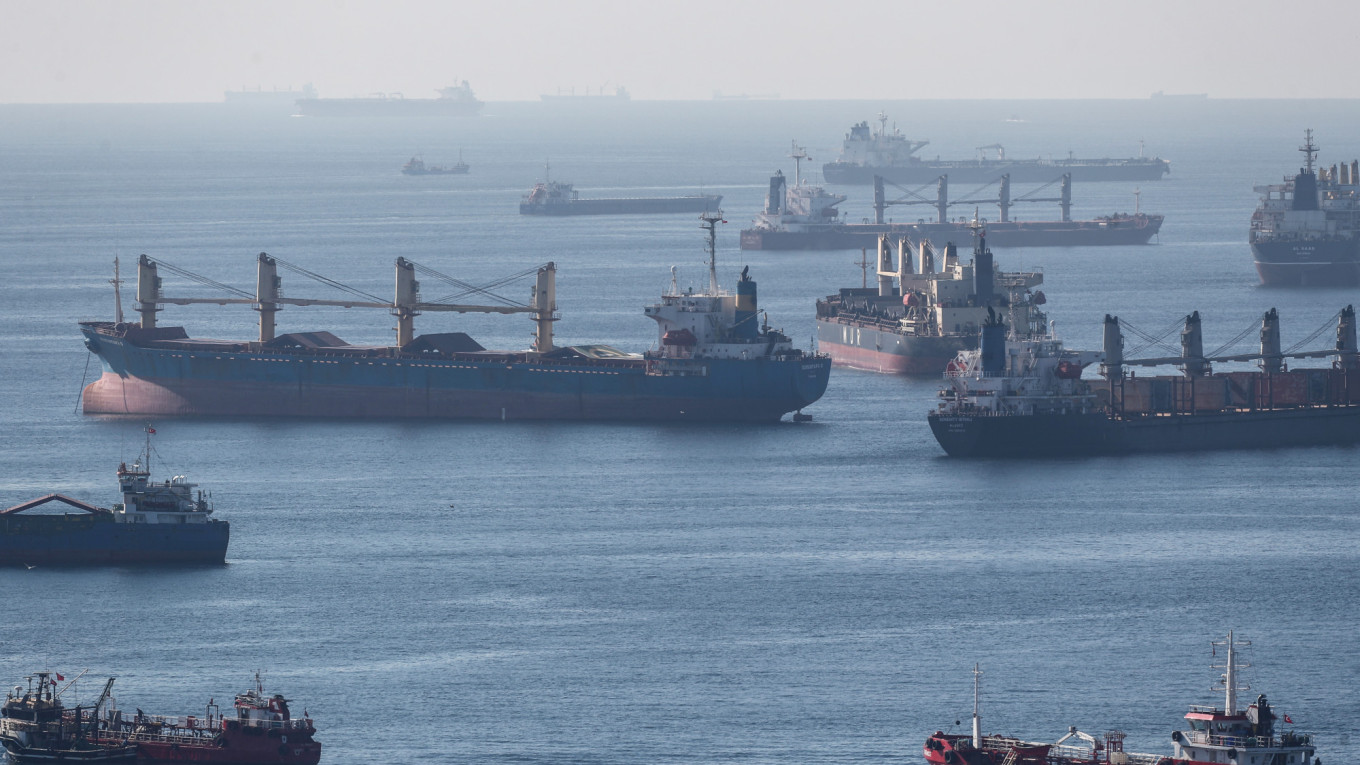Cargo ships loaded with grain and other agricultural products left Ukrainian ports on Monday despite Russia's decision to pull out from a landmark deal designed to ease the global food crisis.
As one of the brokers of the grain deal, Turkey has stepped up diplomacy with the two warring countries in a bid to save it as Russia warned that continuing to enforce the agreement without its participation would be "dangerous".
At least 10 ships including the Ikaria Angel -- chartered by the World Food Programme and loaded with 30,000 tonnes of wheat destined for an emergency response in the Horn of Africa -- left Ukrainian ports on Monday, according to a website that tracks marine traffic.
"Civilian cargo ships can never be a military target or held hostage. The food must flow," Amir M. Abdulla, the UN Coordinator for the Black Sea Grain Initiative, tweeted on Monday.
In all, 12 ships were due to leave Ukrainian ports on Monday and four more were due to head to the country, according to the Joint Coordination Center (JCC) that has been overseeing the agreement brokered by Turkey and the UN.
'Diplomatic feat'
The marine traffic came two days after Russia notified the United Nations and Turkey that it was suspending its participation in the grain agreement, after Moscow accused Ukraine of a "massive" drone attack on its Black Sea Fleet in Crimea.
Ukraine has labelled the Russian charges as a "false pretext".
Moscow also withdrew from ship inspections, which were mandatory under the deal.
Grain prices were up on Monday morning after the Russian decision.
Turkish President Recep Tayyip Erdogan, whose country has stayed neutral throughout the eight-month war in Ukraine, vowed to pursue efforts to keep the agreement in force despite Russia's moves.
"Although Russia acts hesitantly... we will resolutely continue our efforts to serve humanity," Erdogan said.
Turkey analyst Soner Cagaptay said if Erdogan managed to convince Russian President Vladimir Putin to get back to the table, it would underline Ankara's brand as the country that can talk to both Ukraine and Russia, from a neutral stance.
"If Turkey is able to return Russia back to the deal, Ankara will be able to say to everyone 'Hey, let me stay where I am because you know that it works and it helps you.' It could be quite a significant diplomatic feat for Ankara," he told AFP.
NATO member Turkey, which has good relations with its two Black Sea neighbours, has refrained from joining Western sanctions on Moscow and instead bolstered its trade while supplying Kyiv with combat drones.
Monday's shipping schedule was agreed by the Ukrainian, Turkish and UN delegations, with Russia informed of the movements, the JCC said in a statement late on Sunday.
A source familiar with the matter said: "As a signatory to the agreement, they have been requested to take the necessary measures to ensure the safety of the vessels."
'Dangerous'
The Kremlin said it would be "dangerous" to enforce the agreement without its involvement.
"In conditions where Russia talks about the impossibility of guaranteeing the safety of navigation in these areas, such a deal is hardly feasible. And it takes on a different character, much more risky, dangerous," Kremlin spokesman Dmitry Peskov told journalists.
Russian defence minister Sergei Shoigu spoke on Monday to his Turkish counterpart Hulusi Akar about Moscow's suspension of the deal.
"Questions about the suspension, by the Russian side, of the implementation of the agreement on the export of agricultural products from Ukrainian ports as part of the 'Black Sea Grain Initiative' were discussed," the Russian defence ministry said on Telegram.
Akar said ahead of the phone call: "This (agreement) should continue. Suspending this initiative will not benefit Russia, Ukraine or anyone else."
Ukraine, one of the world's largest grain exporters, was forced to halt almost all deliveries following Russia's invasion in late February.
The July deal to unlock its grain exports is critical to easing the global food crisis caused by the conflict.
It had already allowed more than 9.5 million tonnes of Ukrainian grain to be exported and was due to be renewed on November 19.
A separate deal signed with Russia allowed the export of Russian food and fertilisers, despite Western sanctions imposed on Moscow. But it was never implemented, to the dismay of Moscow, which has complained about the issue for weeks.
A Message from The Moscow Times:
Dear readers,
We are facing unprecedented challenges. Russia's Prosecutor General's Office has designated The Moscow Times as an "undesirable" organization, criminalizing our work and putting our staff at risk of prosecution. This follows our earlier unjust labeling as a "foreign agent."
These actions are direct attempts to silence independent journalism in Russia. The authorities claim our work "discredits the decisions of the Russian leadership." We see things differently: we strive to provide accurate, unbiased reporting on Russia.
We, the journalists of The Moscow Times, refuse to be silenced. But to continue our work, we need your help.
Your support, no matter how small, makes a world of difference. If you can, please support us monthly starting from just $2. It's quick to set up, and every contribution makes a significant impact.
By supporting The Moscow Times, you're defending open, independent journalism in the face of repression. Thank you for standing with us.
Remind me later.






